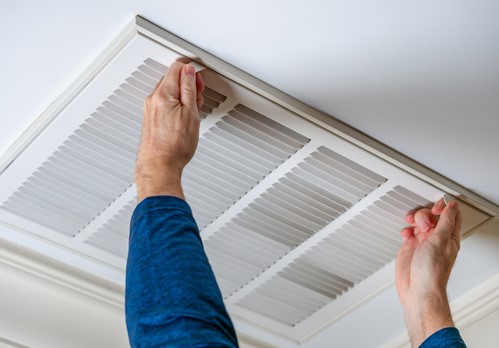June 2023 kicked off what scientists are calling the hottest summer ever—then it got hotter. The temperatures in the first two weeks of July 2023 were the highest ever recorded.

In the world of facilities management, this means HVAC systems in many parts of the U.S. have been working harder than ever. As such, the homeowners, landlords, facilities managers, and maintenance teams who are charged with caring for those systems must ensure they stay on top of HVAC maintenance, especially during these hot summer months.
Keep up with Filter Replacements
The common practice is to replace HVAC filters every 90 days to ensure systems get the airflow they need and those using the facility are not exposed to allergens and bacteria. However, if HVAC systems are running longer—which happens during a heat wave—filters may need to be replaced more often.
Drier conditions can also lead to more dust in the air, which can further shorten the life of filters. Checking to see if light passes through a filter is a good way to see if it needs to be replaced; if you can’t see light, it’s time for a new one.
If it’s time to buy new filters, confirm that you are using the correct minimum efficiency reporting value (MERV) rating for your setting. Most commercial buildings will get sufficient particle filtering with a rating of MERV 5 through 8. For facilities that require above-average air quality, MERV 9 or higher is recommended. However, be careful not to move to a higher MERV rating than your airflow will allow, as too high of a MERV rating will actually force the equipment to run inefficiently.
Repair Leaks in Ductwork
Many factors can cause leaks in ductwork, from simple wear and tear to damage caused by pests. Sometimes, work in areas where ductwork is run, such as installing cables for security or communications systems, can lead to accidental damage.
When ductwork is compromised, the cold air meant to cool the facility ends up being wasted. This can result in higher energy costs, more wear and tear on the system, and a warmer facility.
While regular inspection of ductwork for obvious issues is vital, maintenance teams should also stay alert for signs that ductwork is leaking. These can include longer-than-normal periods of time needed for a facility to cool down, which is sometimes referred to as delayed cooling. Uneven cooling can also be a sign that a duct leak affects certain parts of the facility.
Clean Debris from Exterior Components
Keeping a regular inspection schedule for exterior components is another important step in keeping the system running optimally. This is especially important for components that are positioned in out-of-the-way places—such as a facility’s roof—where obvious issues won’t be easily noticed.
Leaves, twigs, and other debris can block airflow and affect the system’s efficiency. Dirty coils can reduce the system’s ability to dissipate heat, which will also impact efficiency. In extreme cases, debris left unaddressed can interfere with the motor’s operation, shutting down the system completely.
Drain lines are another exterior element of the system that must be maintained. If mold or algae clog the lines, trapped water will typically trigger a sensor that turns the system off. To avoid this, flush the lines every one to three months.
Address HVAC Support Components
While the HVAC system will be the main player in a facility’s cooling system, there are other elements that play a supporting role. For example, window coverings and treatments can keep interior spaces cooler by blocking or reflecting sunlight and the heat it brings with it. Ensuring that those components are operating correctly and being used optimally can make it easier for an HVAC system to do its job.
Insulation is another element that supports the work of the HVAC system, which can include insulation in ceilings and behind walls that keeps cool air from getting out and hot air from getting in. Ensuring that exterior doors and windows are properly sealed and kept closed when not in use is another step toward maximizing insulation and minimizing cooling needs.
This summer’s record temperatures make it more important than ever to properly maintain HVAC systems. Committing to a consistent maintenance routine will ensure that systems run optimally, operating and repair costs are kept under control, and occupants remain safe and comfortable.
Bryan Kelley is the co-founder and CEO of Laser Facility Management and holds decades of experience in project management as a licensed general contractor.
The post Summer HVAC Maintenance Musts appeared first on Facilities Management Advisor.








0 Comments